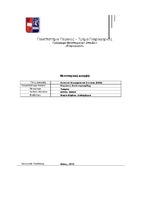| dc.contributor.advisor | Βίρβου, Μαρία | |
| dc.contributor.author | Καλτουρουμίδης, Κυριάκος Ο. | |
| dc.date.accessioned | 2012-10-03T09:09:45Z | |
| dc.date.available | 2012-10-03T09:09:45Z | |
| dc.date.issued | 2012-10-03T09:09:45Z | |
| dc.identifier.uri | https://dione.lib.unipi.gr/xmlui/handle/unipi/5012 | |
| dc.description.abstract | Ένα σύστημα διαχείρισης περιεχομένων (content management system - CMS) είναι η συλλογή των διαδικασιών με τις οποίες μπορεί να γίνει διαχείριση της ροής εργασιών σε ένα συνεργατικό περιβάλλον. Αυτές οι διαδικασίες θα πρέπει να επιτρέπουν σε πολλά άτομα να συμμετέχουν και να μοιράζονται αποθηκευμένα δεδομένα, να ελέγχεται η πρόσβαση στα δεδομένα με βάση τους ρόλους των χρηστών, να βοηθείται η εύκολη αποθήκευση και ανάκτηση των δεδομένων, να διευκολύνεται η σύνταξη εκθέσεων και η επικοινωνία μεταξύ των χρηστών. Τα CMS χωρίζονται γενικά σε πέντε κύριες κατηγορίες με βάση την χρήση τους. Αυτές οι κατηγορίες είναι (1) τα επιχειρησιακά CMS (Enterprise CMS - ECMS), (2) τα συστήματα διαχείρισης Web περιεχομένων (Web CMS - WCMS), (3) τα συστήματα διαχείρισης εγγράφων (Document management system - DMS), (4) τα συστήματα διαχείρισης περιεχομένων συστατικών (Component content management system - CCMS) και (5) τα συστήματα διαχείρισης περιεχομένων φορητών συσκευών (Mobile content management system). Εμείς σε αυτό το κείμενο επικεντρωνόμαστε στα Web CMS. Υπάρχουν πολλά διαφορετικά συστήματα διαχείρισης περιεχομένων στην αγορά σήμερα, μερικά εκ των οποίων είναι εμπορικά συστήματα που έχουν κάποιο κόστος αγοράς και μερικά είναι τελείως δωρεάν και μπορούν να κατεβούν από το Internet και να εγκατασταθούν (ανοικτού κώδικα). Επίσης υπάρχουν διαφορετικοί τύποι CMS που εξυπηρετούν συγκεκριμένους στόχους, όπως για καλάθια αγορών, για λογισμικό κατάρτισης (e-learning), φόρουμ, για ιστολόγια (blog), για διαχείριση σχέσεων με πελάτες, για διαχείριση επαφών πωλήσεων ή CMS που μπορούν να καλύψουν όλες τις λειτουργίες ενός δικτυακού τόπου. | |
| dc.language.iso | el | |
| dc.rights | Αναφορά Δημιουργού-Μη Εμπορική Χρήση-Όχι Παράγωγα Έργα 4.0 Διεθνές | |
| dc.rights.uri | http://creativecommons.org/licenses/by-nc-nd/4.0/deed.el | |
| dc.subject | Βάσεις δεδομένων -- Διαχείριση | |
| dc.subject | CMS (Computer file) | |
| dc.title | Content Management System (CMS) | |
| dc.type | Master Thesis | |
| europeana.isShownAt | https://dione.lib.unipi.gr/xmlui/handle/unipi/5012 | |
| dc.identifier.call | 005.74 ΚΑΛ | |
| dc.description.abstractEN | A content management system (CMS) is the collection of procedures that manage the work flow in a collaborative environment. These procedures must allow a large number of people to contribute and share stored data, to control access to data based on user roles, to aid in easy storage and retrieval of data, to improve the ease of report writing and communication between users. Generally, CMSs belong in five main categories based on their use. These categories are (1) the Enterprise CMS (ECMS), (2) the Web CMS (WCMS), (3) the Document management systems (DMS), (4) the Component content management systems (CCMS) and (5) the Mobile content management systems. In this text we will focus on Web CMS. There are many different content management systems in the market today, some of which are commercial systems that cost a certain amount of money and some are free of charge and can be downloaded from the Internet (open source CMS). Every type of a CMS system serves a different goal, other are better for shopping carts, other for software training (e-learning), forums, blogs, customer management, and contact management or for a web site management. | |



